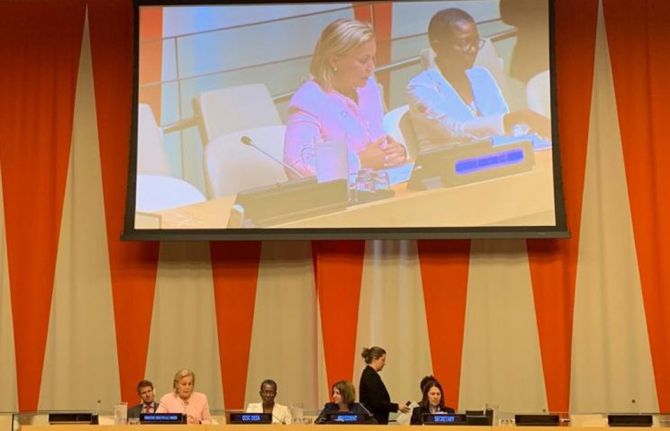

Press Release
United Nations Economic and Social Council calls for urgent action to scale up the AIDS response
26 July 2019 26 July 2019ECOSOC resolution calls for the United Nations General Assembly to convene a high-level meeting to review progress made against the 2016 Political Declaration on Ending AIDS
GENEVA, 26 July 2019—The United Nations Economic and Social Council (ECOSOC) has adopted a resolution that calls on countries to urgently scale up evidence-informed programmes to end the AIDS epidemic as a public health threat by 2030. It says the AIDS epidemic is not yet over and calls for reinvigorated efforts by all stakeholders.
Adopted on 24 July 2019 during ECOSOC’s coordination and management meeting in New York, United States of America, the resolution calls on the United Nations General Assembly to decide by no later than September next year the date of a high-level meeting to review progress made on the United Nations commitment to end AIDS as a public health threat by 2030.
While it welcomes the advances made towards the 2020 targets, the resolution expresses concern about disparities in progress among countries and calls for stronger efforts to protect human rights and promote gender equality.
The ECOSOC resolution also welcomes efforts by UNAIDS to refine and adapt its operating model to more effectively support countries to end the AIDS epidemic within the framework of the Sustainable Development Goals.
“ECOSOC created UNAIDS 25 years ago as an innovative joint venture that brings together the comparative advantages of several United Nations organizations to tackle the AIDS epidemic,” said Gunilla Carlsson, UNAIDS Executive Director, a.i. “Our multisectoral, multistakeholder and people-centred approach helps countries to translate global-level commitments to country-level action that leads to real results for people on the ground, including for those being left behind.”
Acknowledging the urgent need to close the HIV resources gap, the resolution encourages countries to scale up domestic and international funding for the AIDS response.
The resolution recognizes that efforts to achieve universal health coverage should be informed by lessons learned from the AIDS response. It welcomes efforts to integrate and coordinate HIV and other health programmes and sectors, including tuberculosis and HIV, through ensuring universal access to integrated prevention, diagnosis, treatment and care services.
The resolution acknowledges the pivotal role of the Joint Programme in the context of broader efforts to reach the Sustainable Development Goals and the importance of learning lessons from the response to HIV, including a focus on equity and human rights, innovations in health financing and inclusive governance. It also praises the critical role that civil society plays in the global response to HIV.
China and the United States of America co-facilitated Member State consultations on the resolution in Geneva, Switzerland, and introduced the resolution to ECOSOC on 24 July in New York.
UNAIDS
The Joint United Nations Programme on HIV/AIDS (UNAIDS) leads and inspires the world to achieve its shared vision of zero new HIV infections, zero discrimination and zero AIDS-related deaths. UNAIDS unites the efforts of 11 UN organizations—UNHCR, UNICEF, WFP, UNDP, UNFPA, UNODC, UN Women, ILO, UNESCO, WHO and the World Bank—and works closely with global and national partners towards ending the AIDS epidemic by 2030 as part of the Sustainable Development Goals. Learn more at unaids.org and connect with us on Facebook, Twitter, Instagram and YouTube.
Contact
UNAIDS GenevaMichael Hollingdale
tel. +41 22 791 5534
hollingdalem@unaids.org
UNAIDS Media
tel. +41 22 791 4237
communications@unaids.org
Press centre
Download the printable version (PDF)
